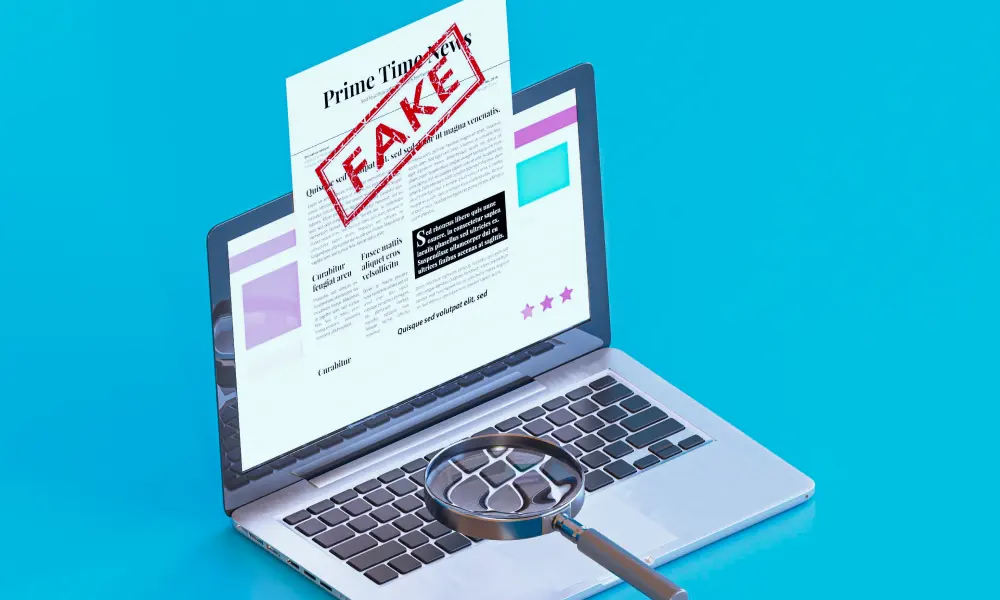Imagine this: A customer looks up your business online but finds negative reviews or outdated information. Within seconds, their trust in your business fades, and they choose a competitor instead. It’s a worrying thought, isn’t it?
Your online reputation matters as much as your real-world image. Whether you’re an individual, a business, or an organisation, what people see about you online shapes their opinions and decisions.
Your reputation online is more than just reviews, it’s the foundation of trust. A single bad review, ignored complaint, or lack of online presence can hurt customer trust, reduce sales, and damage your brand. Sadly, many common reasons, both avoidable and external, can harm your online image without you realising it.
In this blog, we’ll reveal 10 common reasons that may be damaging your online reputation. Let’s get started!
1. Ignoring Negative Reviews

Negative reviews are a natural part of doing business online, but ignoring them can be a serious mistake. When a customer leaves a bad review, it’s usually a sign of dissatisfaction, and if you don’t address it, it can signal to others that you don’t care about customer feedback or complaints. This can lead to a loss of trust, not only from the person who left the review but also from potential customers who read it.
Furthermore, negative reviews that go unacknowledged can pile up, overshadowing positive reviews and potentially creating a false narrative about your brand. Over time, this can damage your reputation and make it harder to attract new customers.
By ignoring negative reviews, you miss the chance to show your commitment to customer satisfaction, and you risk letting small issues escalate into larger, more damaging problems. For tips on effectively managing customer reviews, check out our blog on How to Manage Customer Reviews.
2. Inconsistent Branding Across Platforms

In online world, consistency is key. If your branding, whether it’s your logo, messaging, or tone, varies across different platforms, it can create confusion and undermine your credibility. Customers expect a consistent experience, whether they’re interacting with you on social media, your website, or any other online platform.
Inconsistent branding can make your business appear unprofessional or unreliable. If your logo looks different on Facebook than it does on your website, or if your messaging contradicts across various channels, potential customers may question your brand’s trustworthiness. This inconsistency can also make it harder for customers to recognise your brand, reducing your ability to stand out in a crowded marketplace.
When your branding is scattered or mismatched, it makes it difficult for customers to connect with your brand on a deeper level, potentially leading to a lack of customer loyalty and lost sales opportunities.
3. Poor Social Media Etiquette

Social media is a powerful tool for engaging with your audience and building your brand, but poor social media etiquette can quickly damage your online reputation. Ignoring followers, posting inappropriate content, or getting into public arguments can make your brand seem unprofessional or difficult to engage with.
Social media is a platform where customers expect to interact with brands in a friendly and respectful manner. When your responses are rude, dismissive, or overly aggressive, it can create a negative image of your business. Similarly, if your content is inconsistent with your brand values or tone, it can confuse or alienate your audience.
Failing to maintain good social media etiquette can lead to negative publicity and damaged relationships with customers, making it harder for you to build trust and credibility. In today’s connected world, a single misstep on social media can go viral and have a long-lasting impact on your brand’s reputation.
4. Lack of Engagement with Your Audience

Customer engagement is essential for maintaining a strong online reputation. Failing to respond to comments, address concerns, or interact with followers gives the impression that you don’t value your customers or their feedback.
This lack of engagement can lead to customers feeling ignored, damaging trust in your brand and pushing them toward more responsive competitors.
Additionally, poor engagement can negatively affect your brand visibility, as search engines and social platforms prioritise businesses that actively engage with their audience, further harming your reputation.
5. Neglecting Online Security

In an era where cyber threats are becoming increasingly common, neglecting online security can be disastrous for your brand’s reputation. If your website or social media accounts are hacked or compromised, it can lead to data breaches, exposing sensitive customer information. This not only puts your customers at risk but also severely damages their trust in your business.
Customers expect their personal information to be kept safe, and any security lapse can tarnish your brand’s credibility. A security breach can lead to negative press, loss of customer confidence, and even legal issues.
If your business fails to protect its online presence adequately, it sends the message that you are not taking your responsibilities seriously, further harming your reputation.
Investing in proper online security is crucial for maintaining your brand’s trustworthiness and protecting your customers. A neglected security strategy could cost you much more than just reputation, it could cost you your customers.
6. Ignoring SEO Best Practices

Search engine optimisation (SEO) plays a vital role in your online visibility, yet many businesses overlook its importance. Ignoring SEO best practices can result in poor search engine rankings, making it harder for potential customers to find your website.
If your website is buried on the second or third page of search results, it’s unlikely to attract much traffic, which limits your ability to build a strong online presence.
Neglecting SEO can affect the user experience on your site. A poorly optimised website may have slow load times, broken links, or confusing navigation—all factors that can frustrate visitors and drive them away. This can lead to high bounce rates, low conversion rates, and ultimately, a weakened reputation as a business that fails to deliver a seamless online experience.
By ignoring SEO, you not only miss out on valuable traffic but also risk losing credibility in a digital world where visibility and accessibility are key to success. To ensure your website maintains optimal SEO performance, check out our SEO (Search Engine Optimization) Maintenance Checklist, which provides key steps to keep your site ranking and performing well in search results.
7. Spreading False or Misleading Information

One of the quickest ways to damage your online reputation is by spreading false or misleading information.
Whether it’s misleading claims about your products, services, or even your brand values, misinformation can severely damage the trust you’ve built with your audience. When customers discover that your brand has misrepresented facts, they may feel deceived and lose confidence in your business.
Information spreads quickly. A single misleading post, inaccurate product description, or exaggerated claim can go viral, resulting in negative publicity and potential backlash. Once trust is broken, it can be incredibly difficult to repair, and the damage to your reputation may be long-lasting.
8. Failing to Monitor Your Online Presence

Failing to actively monitor your online presence can leave your brand vulnerable to negative attention, misinformation, or customer dissatisfaction.
In digital world, information about your business can spread quickly, whether it’s a comment on social media, a review, or a mention in an online article. If you’re not regularly checking and responding to these interactions, you may miss opportunities to address concerns before they escalate.
Without consistent monitoring, you risk letting negative feedback, false claims, or even customer complaints linger unchecked, potentially damaging your brand’s reputation.
Additionally, being unaware of what’s being said about your business online can prevent you from identifying trends or issues that need attention, leaving you blindsided by potential reputation crises.
By actively tracking and managing your online presence, you can stay on top of any challenges, protect your brand from harm, and show your audience that you are engaged and proactive in maintaining your reputation.
Check out our blog on why user behaviour analysis is important in SEO?
9. Overlooking Employee Advocacy

Your employees are one of your brand’s most valuable assets, and overlooking their role in advocating for your business can hurt your online reputation.
Employees who are happy, engaged, and aligned with your brand values can become powerful ambassadors, both online and offline. When they share positive experiences and represent your brand with pride, it can enhance your reputation and build trust with your audience.
However, if employees are not encouraged to advocate for the brand, or worse, if they have negative experiences that go unaddressed, they may share their dissatisfaction online.
This can result in negative reviews, comments, or even social media posts that harm your brand’s image. Unchecked, these opinions can spread quickly and affect how the public perceives your company.
To avoid this, it’s essential to foster a positive work environment and encourage employees to engage with your brand online in a constructive manner. Employee advocacy can help amplify your reputation and build credibility, both within your organisation and across the digital landscape.
10. Not Having a Crisis Management Plan

Crises can arise at any moment, and how you handle them can make or break your online reputation. Whether it’s a public relations issue, a product failure, or a negative viral incident, not having a crisis management plan in place leaves you unprepared to respond effectively.
Without a clear strategy, a minor issue can quickly escalate, leading to widespread negative publicity that can severely damage your brand’s reputation.
A lack of preparedness often results in slow, disorganised responses that can make matters worse. In the absence of a plan, your team may struggle to communicate effectively, leading to confusion, inconsistency, and missed opportunities to resolve the situation.
Customers expect swift, transparent communication during a crisis, and failing to provide that can erode their trust in your brand.
Having a well-defined crisis management plan ensures that you’re ready to act quickly and professionally when issues arise. It allows you to protect your reputation, maintain customer confidence, and recover from setbacks more efficiently.
How to Avoid These Mistakes
Protecting your online reputation requires a proactive approach, and avoiding the common mistakes we’ve discussed is a key step in maintaining a positive digital presence.
Respond to Negative Reviews Promptly: Acknowledge negative reviews with empathy and professionalism. Address the concerns raised and offer solutions. This shows potential customers that you care about feedback and are committed to resolving issues.
Maintain Consistent Branding: Make sure that your branding is uniform across all platforms, from your website to social media. Consistency builds recognition and trust, making it easier for customers to identify with your brand.
Be Mindful of Social Media Etiquette: Keep interactions on social media respectful, positive, and in line with your brand’s values. Respond to comments and questions in a timely manner and avoid heated arguments or inappropriate posts.
Engage Regularly with Your Audience: Show your customers that you value them by actively engaging with them online. Respond to comments, acknowledge feedback, and participate in conversations related to your industry or niche.
Prioritise Online Security: Protect your customers’ data and information by investing in robust security measures. Regularly update your systems, use encryption, and stay informed about the latest security threats.
Follow SEO Best Practices: Optimise your website for search engines by using relevant keywords, improving site speed, and creating high-quality content. Regularly update your site to keep it relevant and ensure a positive user experience.
Share Accurate Information: Always ensure that the information you post online is truthful and accurate. Avoid exaggerations or misleading claims, as they can quickly lead to distrust and negative feedback.
Monitor Your Online Presence: Regularly check what’s being said about your brand online. Set up Google Alerts and monitor social media channels for mentions of your business, so you can address any issues promptly.
Encourage Employee Advocacy: Foster a positive work environment and encourage employees to share their positive experiences with your brand online. Their support can help enhance your company’s credibility and amplify your message.
Have a Crisis Management Plan: Prepare for the unexpected by creating a crisis management plan. Be ready to respond quickly and professionally to any situation that may arise, ensuring that you can protect your brand’s reputation when challenges occur.
How Xofts Will Help You With That
At Xofts, we help protect and enhance your online reputation by managing reviews, ensuring consistent branding, improving SEO, and boosting social media engagement.
We also focus on data security, accurate content, crisis management, and employee advocacy to build trust and credibility for your brand. With Xofts, your online presence is in good hands.



